I’d come to Cyprus to wind down from my summer of travel. I was looking forward to a week of evening walks along the seaside promenade in Larnaca and days of lying on the beach under the warm Mediterranean sun. But I was soon diverted by the fascinating history of the island and the myriad things to do in Cyprus. Most fascinating to me was the partitioning of the island following the Turkish invasion of 1974. Today the island is split between the Greek Republic of Cyprus in the south and the Turkish Republic of Northern Cyprus. The city of Nicosia, Cyprus, roughly at the island’s heart, is split between the two, earning it the dubious distinction of being the only remaining divided capital in Europe.
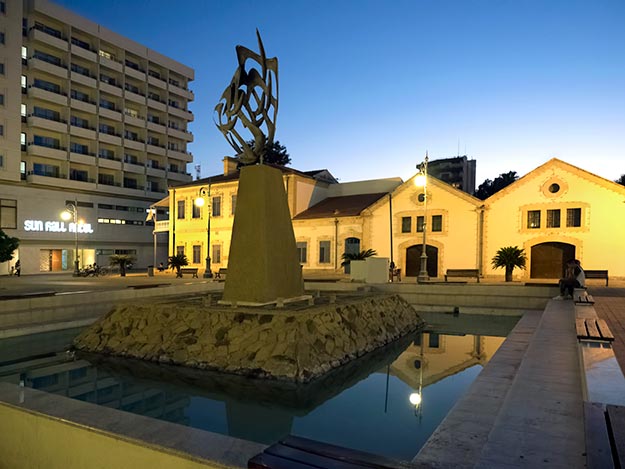
Precariously perched between Asia, Europe, North Africa, Cyprus has been affected by all three continents during its long existence. The first people to inhabit the island came from the eastern Mediterranean during the Stone Age. The Greeks arrived 3,000 years ago and built Kyria, Larnaca, and Salamis. Down though the centuries, Venetians, Egyptians, Assyrians, Persians, Romans, Byzantines, and Ottoman Turks invaded. In 1878 the Turks gave the island to Britain in return for their promise to support the Ottoman Empire against Russian aggression.
By 1931, Greek Cypriots, who comprised the majority of residents on the island, began promoting the idea of reunification with Greece. In a 1950 referendum, 97% of them voted for reunification, but Britain refused to accept the results. Instead, in an attempt to move the country toward independence, Britain drew up a constitution that proposed power sharing between Greek and Turkish Cypriots. Both sides approved the constitution in theory but in practice it never worked. Britain finally gave up, granting Cyprus its independence in 1960.
When Greece began pushing the idea of reunification on the international scene, Turkish Cypriots grew more alarmed and called for partition of the island. Years of demonstrations, riots, and even bombings ensued, culminating with the ouster of all Turks from government positions in 1963. Fearful of the potential for ethnic cleansing of the Turkish population, UN peacekeepers were deployed the following year. Tensions that had been simmering for years finally reached a crisis point in 1974 when the Cypriot National Guard, with the support of far-right military juntas that ruled Greece in those years, mounted a successful coup d’etat. In response, troops from Turkey invaded and took control of 38% of the island. 200,000 Greek Cypriots subsequently fled Turkish-occupied areas in the north, while 60,000 Turkish Cypriots were relocated from the south to the north. Since then, United Nations Peacekeeping Forces have maintained a buffer zone between the two sides.
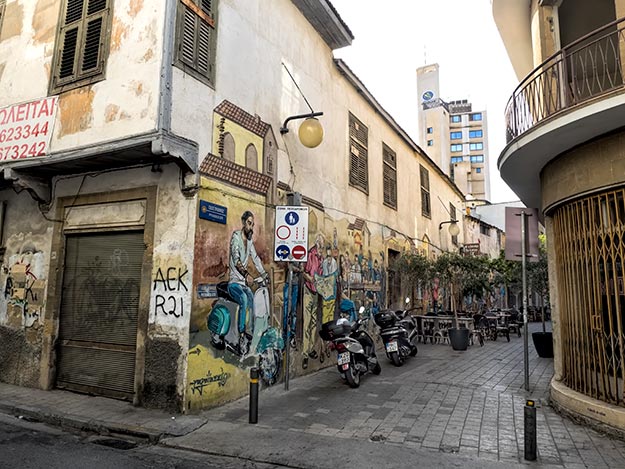
In 1983, the areas controlled by Turkish Cypriots declared itself as the Turkish Republic of Northern Cyprus. To date, no nation other than Turkey has officially recognized North Cyprus as a country. The United Nations lists it as a “territory of the Republic of Cyprus under Turkish occupation.” The European Union accepted Cyprus as a member state in 2004, but suspended the benefits of membership for North Cyprus. The decision to accept Cyprus into the EU, in part, was due to Greece’s threat to block future EU expansion in Eastern Europe unless Cyprus was allowed to join. But the EU also hoped that bringing Cyprus into the fold would act as a catalyst towards a settlement. While there was a brief moment in 2004 when it looked like power sharing might be possible, the Turkish Cypriot electorate became frustrated by the EU embargo and subsequently voted for independence.
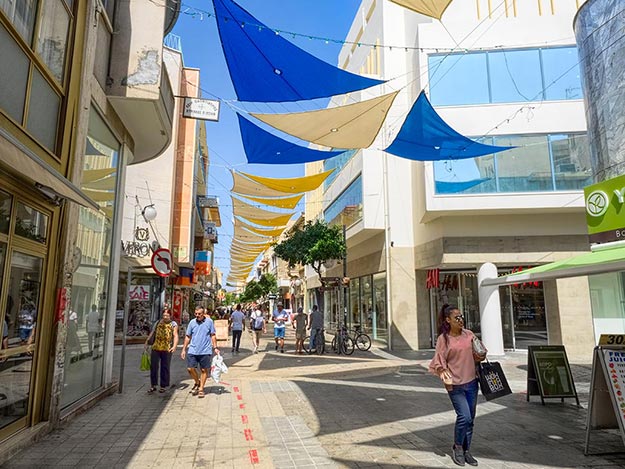
The more I learned, the more fascinated I became. After a couple of days of R&R, I hopped in a taxi for the 20-minue ride to Nicosia. The driver dropped me off at the foot of Ledras Street, the north-south pedestrian thoroughfare inside the old walled city. “Just go straight and you will come to the border checkpoint,” he assured me. I strolled beneath an attractive white and yellow canopy that provided welcome shade, window shopping and fending off hawkers trying to entice people into their restaurants. Half a mile later, a row of stanchions and chain funneled me toward a checkpoint booth. The guard briefly examined my American passport and waved me through without stamping me out of the Republic of Cyprus. A few feet later I handed my passport to the a border official at the entry point for the Turkish Republic of Northern Cyprus. He flipped through it distractedly, handed it back, and waved me through, again without stamping it.
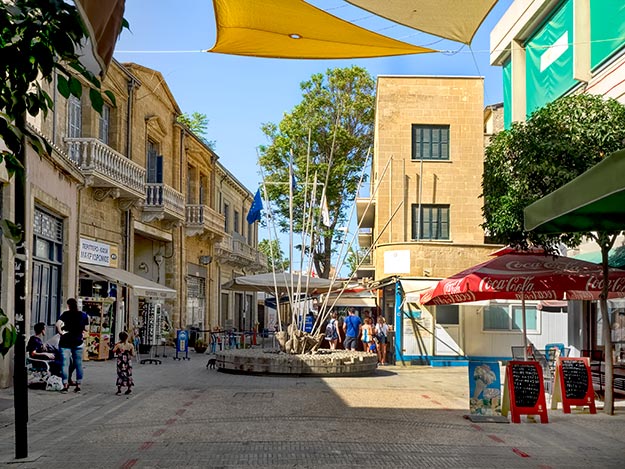
Just a few years earlier, that would have been impossible. For nearly 30 years, no one was allowed to cross the Green Line from either direction. The only way to visit North Cyprus was via ferry or flight from Turkey. Then in 2003, the Turkish Cypriot administration began allowing Greek Cypriots to walk over the border in old Nicosia. Since then, freedom of movement between the north and south has eased considerably, with seven locations allowing crossing by foot and/or car. This unique situation makes a visit to Northern Cyprus rank among the top things to do in Cyprus.
While more relaxed border crossings might suggest an improving situation, every conversation I had about the political situation in Cyprus was dominated by tension, animosity, and mistrust. I asked the taxi driver who took me to Nicosia if he’d been there during the 1974 Turkish invasion. “Yes,” he said in a gravelly voice. “I was a prisoner of war.” “You were in the military?” I asked. His cheeks clenched and he refused to answer. I quickly realized that all these years later, it was still too horrible to discuss.
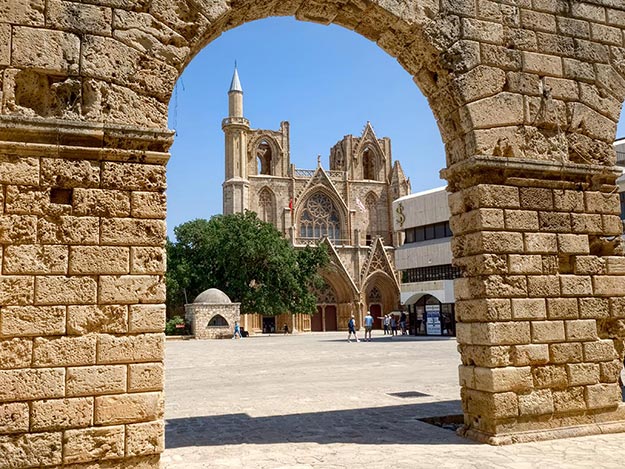
A woman who worked in the mini mart around the corner from where I was staying in Larnaca told me she was 16 when the Turkish invasion happened. Forty-three years later, her voice still quavers when she talks about it. “We lived in Famagusta, on the far eastern tip of the island. One day, we heard rumors that the Turkish army was on the way to seize the town. My family had a lot of land, so all the residents gathered under a tree in our field to decide what to do. We fled before the invading forces. There was no time to take anything. I had only a tank top, shorts and flip flops.” To this day, she has never been back to her former home. When I asked her if she’d tried, she shook her head emphatically. “A few tried, but they were never heard from again.”
Another taxi driver was more willing to talk. He vividly remembered the invasion, even though he was only six years old. “I was born in Famagusta. We lost everything. A few years ago, I went back to find our old house. I told my father that I found it and went inside. He was amazed. He didn’t believe me.” “But wasn’t that dangerous?” I asked. He just shrugged.
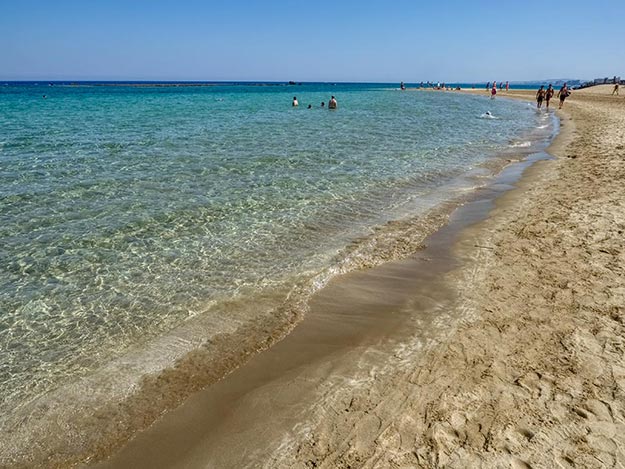
After hearing so much about Famagusta, I had to see it for myself. I booked a day tour that took me into the Turkish occupied territories. After stops at the ancient ruins of Salamis and Saint Barnabus Monastery, we pulled up to the beach at Varosha, a suburb on the south side of Famagusta. Famous for its gorgeous golden sands and turquoise water, Famagusta was home to more than half of the hotels on the island prior to the 1974 invasion. Not only was it the most popular tourist destination in Cyprus, it was regularly ranked as one of the most popular tourist destinations in the world.
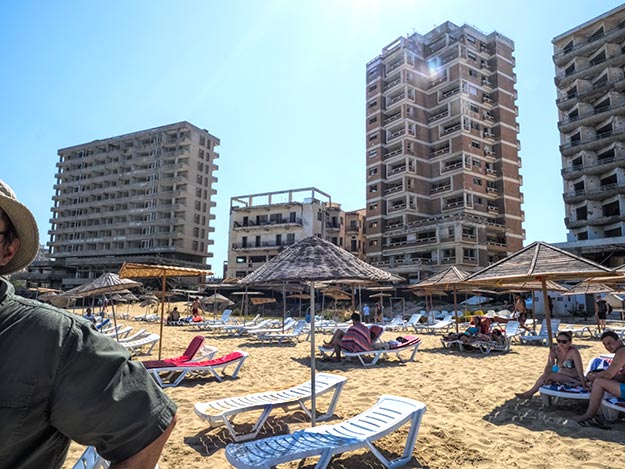
Today the beach is lined by hundreds of abandoned, bombed-out hotels that are off limits to all but the Turkish Army and occasional members of U.N. inspection forces. Our guide warned us that, while photos of the beach are allowed, taking photos or videos of the disintegrating hotel high-rises is strictly prohibited. I vowed to obey the rules but the desire to document was too strong. I turned so that the camera hanging off my shoulder was pointed at the buildings, surreptitiously tilted it up, and began pushing the shutter. I was lucky; several of the photos came out fine, and no soldiers came running out of the watchtower to commandeer my camera. But I was more than relieved when we left the beach.
On the way back to Larnaca, our van turned onto John F. Kennedy Avenue. To our right, children played in front of attractive, modest homes that lined the street. To our left was a no-man’s land where trees protruded from caved-in roofs of homes that have been abandoned for more than four decades. Asphalt roads were overgrown with weeds and brambles. Signs on a high chain-link fence declared, “Access prohibited” and “No entry.” It was surreal. Why, I wondered, was it OK to live on one side of the road but not the other?
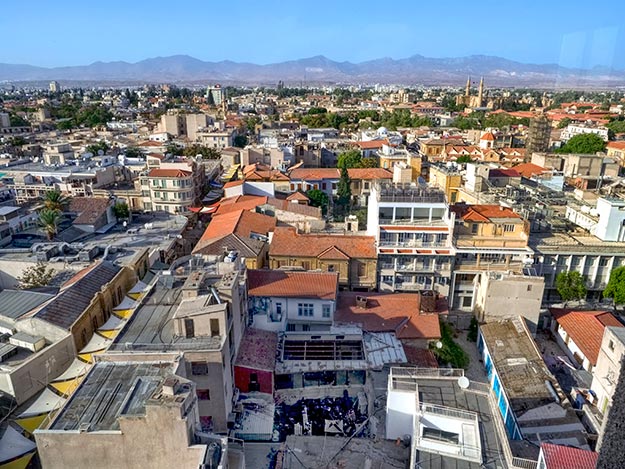
It was a question I later posed to the second taxi driver I interviewed. He speculated that the Turks had been given a map of which parts of the island to take – they wanted half of it – and that Varosha was not on their map. “They ended up with it by mistake but had no interest in running hotels. Now they are useless to anyone but they hold onto them as a bargaining chip. I think they will offer us Varosha back if we agree to recognize the north as a Turkish state. It will never happen,” he added emphatically.
As an outsider, it was impossible for me to know the truth. One person told me that there is no accurate count of the numbers Turks who reside in North Cyprus, and that Turkey is facilitating the relocation of up to 500 Turks from the mainland to the island every month. The implication was that more Turks means the north will be allocated more land in the event a settlement is ever reached.
On of my Facebook followers commented, “(Cyprus is) my parents (sic) birthplace. My mother’s from the North. My father’s from the South…both Greek. The ‘green line’ that separates the communities is believed to have been drawn before the war in 1974 enabling again it is believed, for the U.S.A to have a base in the far NE of the country…aimed at Russia. President Makarios was against such such a base hence the contriving of a war between north and south to gain access to the north and a military base. My mother told me Turks and Greeks lived side by side in villages until politics took over.”
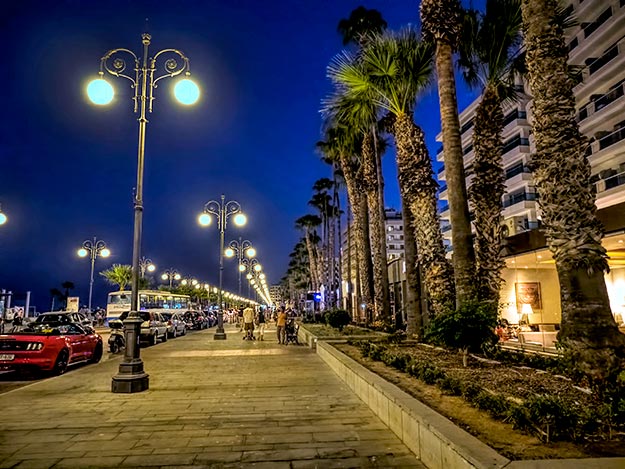
A Greek Cypriot I met in Copenhagen told me that huge reserves of natural gas were recently discovered off the southern shore of Cyprus. This was no rumor. The new field is estimated to contain four trillion cubic feet of offshore gas valued at over $50 billion. Where all other efforts have failed to resolve the decades-long conflict, oil may finally succeed. Turkey has long been searching for a way to eliminate their dependence on Russian oil and the Cyprus fields would offer an attractive alternative. Additionally, Turkey’s acceptance into the European Union has been put on hold until the “Cyprus issue” is resolved.
Though I have no crystal ball, I hope that Cypriots find a path to peace. Both Turkish and Greek Cypriots were warm and welcoming and the island was so rife with history and beauty that I am eager to return. I barely scratched the surface of my list things to do in Cyprus. There are Roman ruins galore, castles, museums, traditional villages on Mount Olympus, casinos, and many gorgeous beaches across the island that I did not have time to visit. But next time, I hope can walk the entire length of Ledras Street without having to run the gauntlet of border checkpoints.

Unfortunately this is the attitude of many people in the north of Cyprus. Turkish Cypriots mostly want peace and unity with Greek Cypriots. But mainland Turks and sadly a few turkish Cypriots have gobbled down the propaganda that we (Greek Cypriots) want unity with Greece, which is a massive lie, to keep our peoples from uniting and removing the invading conqueror (Turkey). Yes, unity with Greece was an idea that was entertained by Greek Cypriots and it was a false one and we know it. We would never repeat that mistake because it brought us where we are today and also taught us the lesson that racism and nationalism have no place in Cyprus. The young generation knows this. On both sides. But the turkish government will always want to have a foothold in Cyprus so they stifle hatred between us. Unfortunately power and influence runs the world, and Cyprus has very little of that, so even though everyone knows what the right thing to do is, no nation is willing to step up and help free Cyprus, and liberate our turkish Cypriot brothers from our invaders.
It’s a very complicated situation, for sure, Panos
The graffiti covered ‘wall art’ is on the Greek side not the Turkish hence the Greek alphabet and number plates and the graffiti naming a Greek football side. I’ve never seen graffiti on the Turkish side in 15 tears
Sorry, * years
Hi as achild we lived next door to Turkish people we played with their children celebrated births weddings gone to funerals we were friends then when I was 6 that all changed the Turkish families had to leave their homes,tha was a sad day .Even at that young age I thought it was unfair we were all Cypriots but politics got in the way. I was 17 that fateful day 20 july like a lot of people we got in the car with nothing but the clothes we wearing thinking we coming home in a few days.My family home was a suburb 10 minutes from Nicosia ,to be so close and yet so far.The days became weeks then months then years, two years later left cyprus and came to Australia for a more peacefull life.When the borders opened in 2003 I went back and actually visited my home it felt good and in some respect gave me closure. Efie
Oh my gosh, Efie! What a horrible thing to have gone through. I’m so pleased that you found a way to get some closure. Thanks so much for your comment.
Thank you for your article. I’m the first born daughter of a Greek Cypriot immigrant to the US from the village of Lapithos, just a little West of Kyrenia 40 miles from the coast of Turkey in North Cyprus. We spent summer vacation with our very large family in Lapithos every few years beginning in 1967. One vacation was the summer of 1974. It was a dreadful time to say the least, and very scary to be a US citizen…I was 18. The American ambassador and his staff had been murdered.
The true Cyprus lives in my personal memory and the beautiful stories my Dad would tell of life on the island when he was a boy and young man. The Turks (Muslim) and the Greeks (Orthodox) lived, worked, and played side by side…..until politics came in, and atrocities committed in the name of some fabricated cause.
I love this island and the fabulous people there. I go back when I can but cannot bear to visit Lapithos and the village Church of Ayios Theodores…it’s just too sad.
Dear Sophia: Thank you so much for sharing your heartfelt story. I hadn’t learned that the American ambassador and his staff had been murdered, so that part was a big shock to me. I hope that some day, sooner rather than later, calmer minds prevail and there can be peace again.
That is a very interesting and informative article – thank you!
I was a travel agent in the 1980s and remember that it was possible then for British citizens to go on day trips to the North. We had a brochure for holidays to the North also, so tourists could stay for a week or two in the North if they wished, but I don’t think they were allowed to visit the South from there. The Greek Cypriot tourist industry was always way bigger and more developed in the South than the Turkish Cypriot one in the North.
Hi Sarah: Thanks for your insight. Looks like things are moving in the right direction, with more open borders and such.
Inspired by you I’ve added Cyprus to my year-long itinerary for 2019. Thanks for all you’ve taught me over the past ten years or so.
Libbie
Hi Libbie – you’re very welcome. Thank YOU for being such a loyal fan. I really, really liked Cyprus, especially the Greek parts. It’s made it to my list of places to which I must return. Think you’ll like it as well.
Hi Barb,
I’ve finally made it to Cyprus! I will be here for two and a half months. I’m on a year long journey, probably my last, and decided to spend the winter in Cyprus. I arrived about 10 days ago. AirBnB makes coming here easy and affordable.
Libbie
Firstly great article and cool photos Barbara Weibel.
I was never exposed to history of Cyprus in schools. Clear, interesting and informative matter.I will definitely visit this beautiful place one fine day.
Thanks for sharing your thoughts.
You’re very welcome, Jennifer. Hope you get to visit Cyprus someday. I’m looking forward to returning to see more of the island.
This is a fascinating account and I’ve realised how little I actually know about the recent history of Cyprus even though I feel I should know more. I visited in 1988 and remember my visit well. One thing that has puzzled me though is when you said that until 2003 there had been no border crossings allowed for almost 30 years. I stayed in the Greek part of Cyprus and made a day trip across the border to the Turkish part. I crossed the border in Nicosia – I don’t know if crossings could be made anywhere else. Crossing from the Greek side to the Turkish side we were only allowed to make a day trip. This was a Greek rule, not a Turkish one as the Turkish Cypriots didn’t mind how long you stayed once you were there or if you crossed the other way how long you stayed in the south. Of course once you were on the Turkish side the Greek Cypriots had no control over whether you came back or not, so the only way they had of trying to prevent you from staying there was to check that you only had ‘day’ luggage with you. Some friends wanted to stay in the north as their parents were on holiday there so they crossed wearing all their clothes so they wouldn’t look like they were carrying extra luggage. The clothes they couldn’t fit on, my friend and I wore for them. I don’t know what would’ve happened if you wanted to come back to the Greek part if you’d stayed longer than a day in the north – would they refuse you entry? Issue a fine? I don’t know. The other thing I remember about my day in Turkish Nicosia was not really wanting to change money just for a day. We only really needed to spend money for lunch and so asked in a cafe if they accepted Greek Cypriot pounds (they used Turkish lira in the Turkish part). ‘No’ the man said. As we made to walk away, he called us back, ‘But we do accept Cypriot pounds’. Oohps! We didn’t make that mistake again and remembered to say drop the ‘Greek’ from in front of ‘Cypriot pounds’!
How interesting, Anne. I was told that no crossings were allowed until 2003, but given your experience, I wonder if that meant no crossings for Greek Cypriots – perhaps other nationalities were allowed to make the crossing. Thanks for sharing your experience.
Yes we were not allowed and many other nationalities aswell.the border is being checked by the un so particularly british citizens had it easy to travel back and forth in the old days. I remember when they opened the borders…it was a very emotional day… Our perception of living is totally different after the invasion.. the pain will always be there.
Hello Cypriot: I definitely felt that pain when I talked to locals, even after all these years. I pray that there will be some resolution to the situation that will be acceptable to all, and soon.
I have been living on the island for about 3 years and while I was reading an article above, it literally brought me back for a moment in there. I still have the vivid image of this country and the eternal sorrow memories of its people. All that make me feel the profound feelings of the rigid historical events of the past days. Reading the article was like a stroll on the memory lane.
“Sas Efharisto para poli”.
Thank you Vika – saying that my story brought back memories for you is one of the best compliments you can give to a writer 🙂
Beautiful article ??
Such an interesting read, Barbara! So much history, tension, and varied perception from native inhabitants (and carried to the next generation). Fabulous photos too!
Thanks so much Crystal! You always make my day with your kind comments.
This is fascinating – something I certainly didn’t learn in history in school. Your photos are beautiful!
Thanks so much Jill. The more I travel, the more I realize there is so much history out there we never learn in school. Glad you enjoyed the article and stories.
Some of it is true . But don’t make out the Greeks are terrified they are traveling to the north all the time .inthere casinos shopping .beaches .and it is not the un keeping peace it is the Turkish soldiers . Un are doing nothing but tanning there selves on the beaches . Although the Turks want a settlement . It’s the Greeks that don’t and want to unite the island with greece
By going there were making the north richer not the turkish yeah ?
Barbara Barbara please go to Cyprus via Turkey and experience the difficulties we have to put up with due to unfair sanctions administered by the British the Greek administered so called Cyprus government and the modern day crusaders the EU.
There can only be one solution and that is two separate states ,you have touched the history through the Greek Cypriot eyes ,once you get the other side’s view then you can give out a more balanced point of view to the Cyprus problem which was settled once and for all in 1974.
So you think????